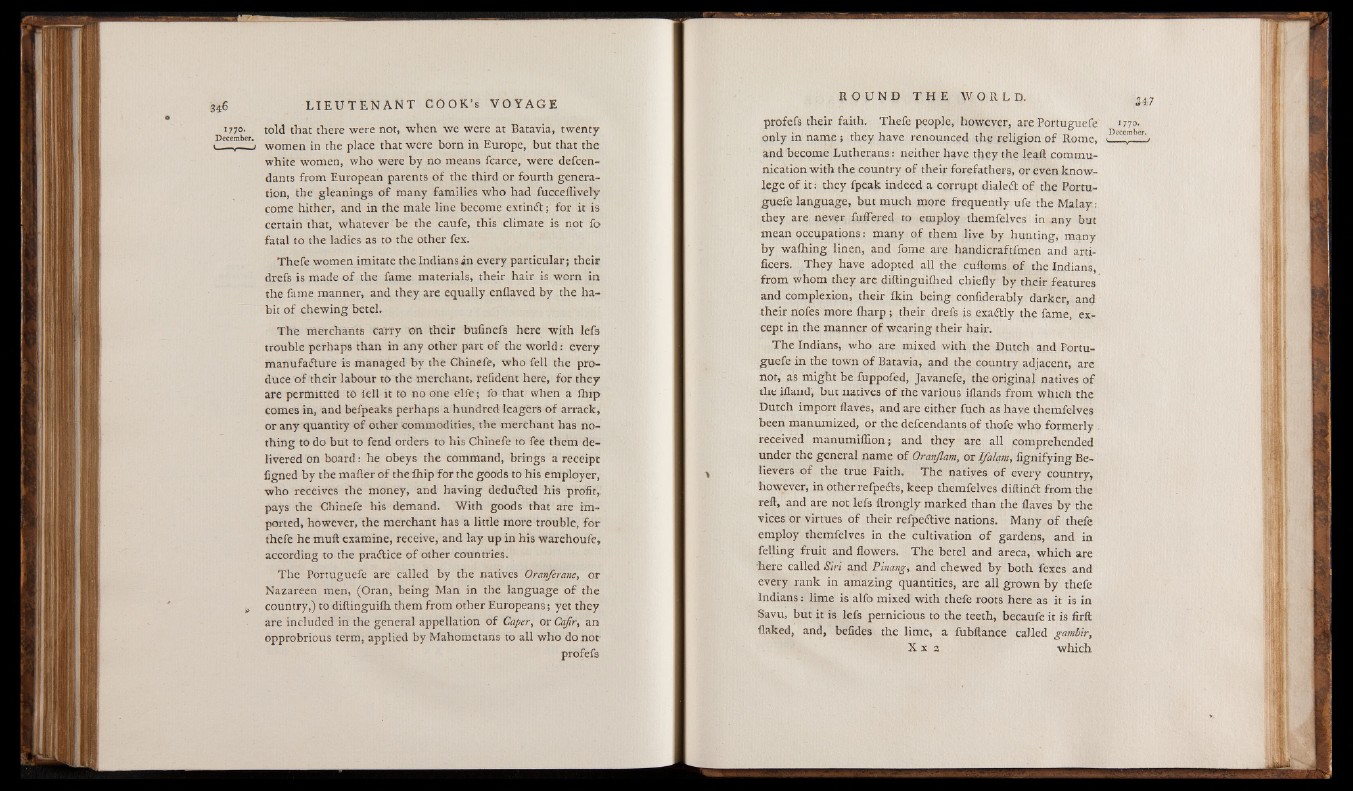
>77°- told that there were not, when we were at Batavia, twenty
> — — women in the place that were born in Europe, but that the
white women, who were by no means fcarce, were defcen-
dants from European parents of the third or fourth generation,
the gleanings of many families who had fucceflively
come hither, and in the male line become extind; for it is
certain that, whatever be the caufe, this climate is not fo
fatal to the ladies as to the other fex.
Thefe women imitate the Indiansin every particular; their
drefs is made of the fame materials, their hair is worn in
the fame manner, and they are equally enilaved by the habit
of chewing betel.
The merchants carry on their bufinefs here with lefs
trouble perhaps than in any other part of the world: every
manufacture is managed by the Chinefe, who fell the produce
of their labour to the merchant, refident here, for they
are permitted to fell it to no one elfe; fo that when a fhip
comes in, and befpeaks perhaps a hundred leagers of arrack,
or any quantity of other commodities, the merchant has nothing
to do but to fend orders to his Chinefe to fee them delivered
on board: he obeys the command, brings a receipt
figned by the mailer of the fhip for the goods to his employer,
who receives the money, and having deducted his profit,
pays the Chinefe his demand. With goods that are imported,
however, the merchant has a little more trouble, for
thefe he muft examine, receive, and lay up in his warehoufe,
according to the practice of other countries.
The Portuguefe are called by the natives Oranferane, or
Nazareen men, (Oran, being Man in the language of the
„ country,) to diftinguifh them from other Europeans; yet they
are included in the general appellation of Caper, or Cajir, an
opprobrious term, applied by Mahometans to all who do notprofefs
profefs their faith. Thefe people, however, are Portuguefe
only in name ; they have renounced the religion of Rome,
and become Lutherans: neither have they the leaft communication
with the country of their forefathers, or even know-
lege of i t : they fpeak indeed a corrupt dialed of the Portuguefe
language, but much more frequently ufe the Malay
they are never fullered to employ themfelves in any but
mean occupations: many of them live by hunting, many
by wafhing linen, and fome are handicraftfmen and artificers.
They have adopted all the cuftoms of the Indians,
from whom they are diilinguiihed chiefly by their features
and complexion, their ikin being confiderably darker, and
their nofes more fharp ; their drefs is exadly the fame, except
in the manner of wearing their hair.
The Indians, who are mixed with the Dutch and Portuguefe
in the town of Batavia, and the country adjacent, are
nor, as might be fuppofed, Javanefe, the original natives of
the ifland; but natives of the various iflands from which the
Dutch import Haves, and are either fuch as have themfelves
been manumized, or the defcendants of thofe who formerly
received manumiflion; and they are all comprehended
under the general name of Oranjlam, ox Ifalam, fignifying Believers
of the true Faith. The natives of every country,
however, in other refpeds, keep themfelves diftind from the
reft, and are not lefs ftrongly marked than the Haves by the
vices or virtues of their refpedive nations. Many of thefe
employ themfelves in the cultivation of gardens, and in
felling fruit and flowers. The betel and areca, which are
here called Sin and Pinang, and chewed by both fexes and
every rank in amazing quantities, are all grown by thefe
Indians: lime is alfo mixed with thefe roots here as it is in
Savu, but it is lefs pernicious to the teeth, becaufe it is firft
flaked, and, befides the lime, a fubftance called gambir,
X x 2 which